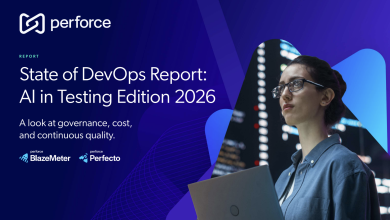
Artificial intelligence (AI) is rapidly transforming industries, reshaping how businesses operate, innovate, and engage with customers. In the UK, AI adoption is steadily increasing, and the market is estimated to grow to over $1 trillion by 2035 according to the US International Trade Administration. While AI offers immense potential for efficiency, productivity, and customer satisfaction, a widening skills gap threatens to hinder business growth. Recent studies suggest that by 2030, around 20% of the UK workforce—approximately 6.5 million people—will be significantly under-skilled for their jobs. This stark reality underscores the need for continuous learning and upskilling to ensure businesses and their employees remain competitive in an AI-driven world.
Despite AI’s promise to enhance productivity, efficiency, and customer satisfaction, many organisations struggle to deploy it effectively due to lack of skilled professionals. According to PwC, 57% of workers believe generative AI (GenAI) could improve their efficiency, yet nearly 60% of employees have never received any training to develop these crucial digital skills. In such a fast-paced environment, continuous learning is a necessity. Businesses that fail to prioritise AI upskilling risk stagnation, while those that embed a culture of learning and adaptation will be at the forefront of innovation.
The Transformative Power of AI
AI has already made significant inroads across various industries. In retail, AI-driven analytics optimise inventory management and personalise customer experiences. In finance, AI is revolutionising fraud detection and risk assessment, enabling faster and more accurate decision-making. Healthcare is leveraging AI for diagnostics, drug discovery, and patient management, leading to improved outcomes and operational efficiency.
Within the IT sector, AI’s impact is profound. Organisations are using AI to drive code migration, enhance customer service, and automate routine processes, resulting in remarkable efficiency gains. Digital-native companies are pushing the boundaries further, leveraging AI to streamline workflows and refine decision-making. However, successful AI deployment requires more than just implementation—it demands robust data curation, bias mitigation, and continuous model training to ensure fairness and effectiveness. AI is not merely about automation but augmentation—allowing employees to focus on high-value tasks while AI handles the repetitive and time-intensive elements of work.
The AI Skills Gap and the Need for Continuous Learning
The biggest barrier to AI adoption is not technology—it is talent. The UK’s AI skills gap is widening, with demand for AI-related expertise far outpacing supply. Coursera’s Global Skills Report 2024 places the UK 45th globally in business, technology, and data science proficiency, lagging behind key European competitors. Brexit has further exacerbated this issue by restricting the influx of skilled professionals, while the breakneck pace of technological evolution has left many workers struggling to keep up.
To bridge this gap, businesses must take proactive measures. Traditional training models—such as infrequent workshops—are no longer sufficient in a world where AI technologies evolve rapidly. Instead, organisations should embed continuous learning into their culture. AI-driven learning platforms can personalise training paths based on individual roles and industry needs, ensuring employees gain relevant skills applicable to their specific domains.
Furthermore, organisations need to rethink their recruitment strategies. Instead of solely seeking external AI experts, businesses should focus on reskilling their existing workforce. Employees across various functions—from marketing and HR to supply chain management—should develop foundational AI knowledge, enabling them to integrate AI seamlessly into their work.
AI and Ethical Considerations
As AI adoption accelerates, so too does the responsibility to address ethical concerns, particularly around data privacy, bias, and security. Public and business sentiment towards AI remains cautious, with fears that AI-driven decision-making could be opaque, discriminatory, or invasive. In response, European regulators have introduced stringent policies, including the EU’s AI Act, which categorises AI applications by risk level and enforces stricter compliance requirements for high-risk systems.
For businesses, ethical AI deployment is not just about regulatory compliance—it is a matter of trust. Consumers and stakeholders expect transparency in AI-driven decisions. Organisations must proactively address bias by carefully curating training data and regularly auditing AI models to ensure fairness. Security is another critical concern, requiring robust safeguards to protect sensitive data and intellectual property. Additionally, businesses should be transparent about how AI influences decision-making, offering explanations where necessary to foster trust and confidence.
Developing ethical AI should also be a collaborative effort involving regulators, businesses, and academia. Cross-industry partnerships can help establish best practices, ensuring AI is developed and deployed responsibly to serve the broader interests of society rather than exacerbating existing inequalities.
The AI-First Mindset: Integrating AI into Business Strategies
To integrate AI successfully, businesses must undergo a fundamental shift in mindset. Just as digital-first and mobile-first strategies became essential in previous technological revolutions, companies must now embrace an AI-first approach. This means embedding AI across all operations—from customer service and HR to logistics and finance.
An “AI-first” strategy ensures that AI is seamlessly integrated into every service, enhancing decision-making, automating repetitive tasks, and unlocking new insights from vast datasets. However, AI adoption alone is not enough—companies must also cultivate AI literacy within their workforce. Employees must be empowered with the skills and confidence to collaborate with AI rather than fear it as a job threat.
Leadership plays a crucial role in this transformation. Business leaders must champion AI as a strategic priority, ensuring AI initiatives align with broader organisational goals. Establishing AI governance frameworks will be vital to mitigating risks while maximising AI’s benefits. Furthermore, companies should set clear metrics to measure AI’s impact, demonstrating tangible returns on investment.
In conclusion, the rapid evolution of AI presents both challenges and opportunities. While AI has the potential to revolutionise industries, its success depends on businesses’ ability to adapt and cultivate a workforce that can harness AI effectively. The skills gap remains a significant hurdle, but organisations that invest in continuous learning, ethical AI deployment, and an AI-first strategy will position themselves for long-term success.
In today’s digital economy, staying ahead requires staying informed. Companies that prioritise AI literacy and empower their workforce with the necessary skills will not only maintain a competitive edge but will drive the next wave of innovation. The future belongs to those who embrace AI—not as a disruptive force, but as a transformative catalyst for business growth, efficiency, and progress.



